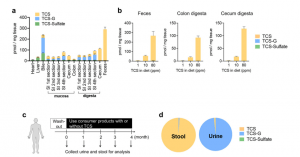A recent study using murine models has reported that an antimicrobial found in toothpaste, triclosan (TCS), in addition to other toys and products, can lead to or trigger gut inflammation.
Zhang, et al., have characterised the bacteria and specific enzymes that are responsible for triggering TCS’s adverse effects. In addition, through investigation using mice, they have found that these bacterial enzymes can be inhibiting or blocked from driving intestinal inflammation and subsequent harm (Figure 1).

Figure 1: TCS exposure in mice and humans leads to accumulation of free TCS in the colon. a After the mice were treated with 80 ppm TCS via diet for 4 weeks, cecum digesta and fecal contents exhibit high levels of free TCS while a mixture of TCS and metabolites is observed elsewhere (n = 10 mice per group). b Mice were treated with 1, 10, and 80 ppm TCS via diet for 4 weeks. At all test doses, the gut tissues, including feces, colon digesta, and cecum digesta, exhibit high levels of free TCS and low levels of its metabolites (n = 7–8 mice per group). c After a washout period, human subjects used personal care products, with or without TCS, for up to 4 months. Twenty-three fecal but only seven urine samples were collected. d The dominant compound in the stool samples of TCS-exposed human subjects was free TCS (n = 23), while the dominant compound in the urine samples of TCS-exposed human subjects was TCS-G (n = 7). See absolute concentrations of TCS and its metabolites in Supplementary Tables S1and 2. The data are mean ± SEM. Source data are provided with this paper. Abbreviations: TCS: triclosan, TCS-G: triclosan-glucuronide, TCS-sulfate: triclosan-sulfate. Part of the picture was adapted from motifolio.com (Zhang, et al., 2022).
Through identification of the bacteria that are causing such harm as a result of TCS, novel treatments could be developed for the diagnosis, prevention and treatment of inflammatory bowel diseases.
Previous studies have reported on the toxicity of TCS, however, in this present study the authors investigated the changes induced by TCS on the gut microbiota. The researcher’s microbial enzymes within the gut and noted that beta-glucuronidase (GUS) proteins and TCS triggered inflammation within the gut.
Following identification of these enzymes, they proceeded to use microbiome-targeted inhibitors to block processing of TCS in the gut. Inhibiting and/or blocking this process in mice prevented inflammation and damage to the colon including alleviating symptoms of colitis, a form of inflammatory bowel disease. This may provide insight into possible treatment of inflammatory bowel disease (IBD).
Being so widely using in soaps and other products, TCS was removed from handwashing products due to growing concern for resistant bacteria, especially within the hospital setting. However, TCS remains in several other products including cosmetics, yoga mats, etc in order to reduce bacterial contamination. In addition, it is added to toothpaste for prevention of gingivitis.
In their own words:
“…here we connect specific gut microbial enzymes with the metabolic reactivation of TCS in the colon and show that these enzymes drive adverse events caused by TCS. The data presented will help to better evaluate the individual effects of TCS in different populations. They also suggest that the safety of TCS and related compounds should be reconsidered given their potential for intestinal damage. Beyond TCS, it seems likely that gut microbial enzymes could contribute to the metabolism and toxicology of other chemicals, highlighting the critical importance of incorporating the microbiota in our understanding of environmental toxicology and mechanisms of disease.”
Journal article: Zhang, J., et al., 2022. Microbial enzymes induce colitis by reactivating triclosan in the mouse gastrointestinal tract. Nature Communications.
Summary by Stefan Botha










